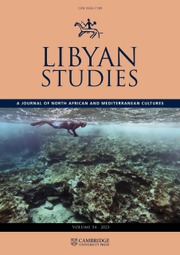Article contents
Consul Warrington's English Garden
Published online by Cambridge University Press: 03 March 2015
Abstract
In 1820, when he had already been six years in Tripoli, the British Consul General, Colonel Hanmer Warrington, acquired a small country estate about a mile beyond the city walls. The move had political implications that he may not have considered or appreciated at the time. But the fact that for a quarter of a century (1820-46) Consul Warrington lived most of the year, and eventually all the year, in this so-called ‘English Garden’ in the oasis-suburb of the menscia brought this influential, larger-than-life figure into much closer, personal contact with local dissident and opposition figures than he would ever have done had he been always shut up in town. In the decade 1832-42 Consul Warrington's official diplomatic position in Tripoli, together with his informal role as doyen of the menscia residents, placed him in a unique position to meddle and mediate in the affairs of the Regency of Tripoli. Such was the case under the semi-independent Karamanli regime and, after 1835, under the Ottoman Turkish administration ruling direcdy from Constantinople. Although the rewards of this risky policy might have been spectacular for Warrington and for Great Britain (and they were nearly achieved in 1842), such success was elusive.
Information
- Type
- Notes
- Information
- Copyright
- Copyright © Society for Libyan Studies 2004
References
- 3
- Cited by

